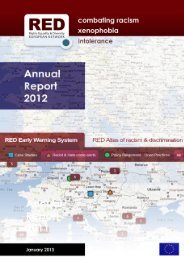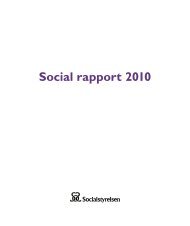Entry Testing and the Overrepresentation of Romani ... - UR Research
Entry Testing and the Overrepresentation of Romani ... - UR Research
Entry Testing and the Overrepresentation of Romani ... - UR Research
- No tags were found...
You also want an ePaper? Increase the reach of your titles
YUMPU automatically turns print PDFs into web optimized ePapers that Google loves.
R44PITFALLS AND BIASCOUNTRY-SPECIFIC RECOMMENDATIONSAlthough <strong>the</strong> Czech government has in name abolished special primary schools for pupils with mild intellectualdisabilities, <strong>the</strong> issues around inequities in educational opportunities still exist in <strong>the</strong> newly named “practical”primary schools. This has not created a “unified” system <strong>of</strong> schooling, but ra<strong>the</strong>r has legally ossified <strong>the</strong> segregatedsystem. The following recommendations are related to current testing practices, not to <strong>the</strong> overall system <strong>of</strong>special education. However, <strong>the</strong>se recommendations support working towards a truly unified system <strong>of</strong> schooling,where no child would be placed in special or segregated classes <strong>and</strong> where each child would receive <strong>the</strong> appropriatesupports <strong>and</strong> adaptations to allow him or her to participate meaningfully in <strong>the</strong> mainstream curriculum inmainstream classes.– Access to kindergarten: Kindergarten should be free <strong>and</strong> compulsory for two years before entry into first grade.Kindergarten should focus on providing opportunities for children to explore, play, <strong>and</strong> develop <strong>the</strong>ir interestsalongside promoting social <strong>and</strong> o<strong>the</strong>r skills that will equip <strong>the</strong>m for success in primary school. Kindergartenshould also be inclusive, working with children to develop skills with <strong>the</strong>ir peers, without streaming children topreparatory classes before <strong>the</strong>y enter <strong>the</strong> first grade <strong>of</strong> primary school.– Access to early childcare: Following <strong>the</strong> framework <strong>of</strong> <strong>the</strong> 2008 Ministry <strong>of</strong> Education Concept <strong>of</strong> Early Childcarefrom Socioculturally Disadvantaged Environments in order to develop a seamless <strong>and</strong> inclusive transition frombirth to preschool to primary school <strong>and</strong> beyond, <strong>the</strong> Ministry <strong>of</strong> Education should continue cooperation with<strong>the</strong> Ministry <strong>of</strong> Health <strong>and</strong> <strong>the</strong> Ministry <strong>of</strong> Labor <strong>and</strong> Social Affairs in providing educational activities aimed atproviding children <strong>the</strong> skills <strong>and</strong> opportunities needed for success in school.– School readiness testing: Any assessment <strong>of</strong> a child’s skills before entry into kindergarten or primary schooling shouldbe used only as a formative tool to identify children’s areas <strong>of</strong> strengths <strong>and</strong> needs to address in <strong>the</strong> general educationclassroom. At no time should any assessment determine <strong>the</strong> placement <strong>of</strong> a child in a practical or special school.– Special school placement: End <strong>the</strong> practice <strong>of</strong> placing pupils in special/practical primary schools; instead, train <strong>and</strong>transfer <strong>the</strong> expert staff from <strong>the</strong>se facilities to st<strong>and</strong>ard primary schools to serve as co-teachers or consultantswho work with teachers to develop individualized supports, methods, activities, <strong>and</strong> materials for all pupilswho need <strong>the</strong>m. In addition, psychological <strong>and</strong>/or educational assessments should be used to target academicor behavioral strengths <strong>and</strong> needs to address in <strong>the</strong> general education setting, not as a mechanism throughwhich children are segregated into special classes. If a child is assessed, <strong>the</strong> assessment session should followtesting protocols <strong>and</strong> <strong>the</strong> diagnostic methods currently used in <strong>the</strong> Czech Republic, such that <strong>the</strong> instrumentitself is but one <strong>of</strong> four pillars upon which a diagnostic determination is made: (1) st<strong>and</strong>ardized tests, (2) interviews,(3) observations, <strong>and</strong> (4) informal assessment procedures.




